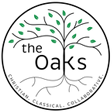Academics – Kindergarten through 12th Grades
[/col_inner] [/row_inner]
Charlotte Mason said, “The habits of the child are, as it were, so many little hammers beating out the character of the man.” We recognize that in the early years, children need much habit forming training that lays the foundation for both their education and faithfulness. Parents, mothers in particular, are best suited to focus on that early training primarily in the home. The earliest years of academic education can be accomplished in fewer hours at home than in a classroom, and young children can spend more time with imagination and play which also lay the building blocks for future learning. We find that our model is particularly effective at meeting these goals while capitalizing on the benefits of learning in a classroom.
The classes at The Oaks are engaging and joyful, because one of the hallmarks of a truly Christian and classical education is that it draws the child into a way of life and thinking not only by the head, but by the heart. According to the classical model, we focus on the particular ways students learn at the various stages. We incorporate catechism, scripture memory as well as poetry, and start each day with morning liturgy.
In our high school, we incorporate Socratic discussion and the Harkness Table method. These encourage student led discussion, dialogue, collaboration and respectful persuasion. We see this as a key component to fostering a love of learning while teaching students how to think and how to communicate effectively.
The Oaks Tutorials works in partnership with parents in every way. We provide classroom instruction 2 days each week on Mondays and Thursdays. Students continue their studies at home the other school days, guided by parents and teacher provided syllabi. Fridays are scholè days. Scholè is the Greek word for “leisure”, and applied in education is more about the heart and attitude during the process of learning and learning aimed at a higher purpose. We are choosing the name “Scholè Fridays” because we’d like to see students use these days for extra learning like music lessons, field trips, home economics (cooking, cleaning, sewing, etc.), shop, or service projects. Along with our quarterly events, we often suggest some enrichment for Fridays. Students usually have math and some reading assigned, but the academic workload is generally lighter for grammar students on this “home day”. Older students still need to use this as an academic day, but we like to keep scholè in mind in every aspect of their education. The aim is for their higher purpose, not just academic achievement.
Our Teachers
Teachers are at the core of any successful academic endeavor. You can have the best of intentions and the best curriculum choices and still completely miss the mark apart from excellent teachers. We recognize this and consider the hiring of teachers our highest priority. We seek to engage teachers who love the Lord, have good theology and a heart for the kingdom primarily, followed by a mastery of and a love for the subjects they are teaching. Translating their love of learning to the students is at the heart of a Christian classical education. Our teachers lead students into learning – teaching them the right questions to ask and the proper ways to frame them. They are excited to be in the classroom and truly care about their students.
[/col] [/row] [row label=”Member 2: Change Color” col_bg=”rgb(255,255,255)”] [col span__sm=”12″ margin=”10px 0px 10px 0px”] [row_inner style=”collapse”] [col_inner span__sm=”12″ span__md=”7″ padding=”40px 40px 40px 40px” class=”team-sorted-info”] [gap height=”5px”]Our Scope
Introducing the “great conversation” of our Christian heritage to our children is best done by leading them in conversation, which is why we view our teachers as a key part of their education. Our collaborative model of two days in the classroom and three days at home allows parents to be extensively involved in this conversation as well. To add to this, we are also implementing a cyclical study of history, allowing for all the grammar children to participate in this conversation together. A four year cycle (beginning with Ancient Civilizations, proceeding to the Middle Ages, then Renaissance and Reformation, and ending with the Scientific Revolution to the present day) allows for students to complete the full cycle no less than two times by the time they graduate.
A classical Christian education views all knowledge as interrelated and shows many links between fields of study so that nothing is learned in isolation. Other subjects can be easily linked to History studies. Literature lists are curated to the time period of study and science classes include relevant scientific discoveries. This systematic and cohesive approach teaches the students to draw connections and shed light on other things they are learning, avoiding the compartmentalization of subjects, and ultimately helping them to acknowledge that all things have been created by and for Christ, and that it is through him that all things hold together (Col. 1:17).
[/col_inner] [/row_inner] [/col] [/row] [/section] [gap height=”40px”] [blog_posts columns__sm=”1″ animate=”fadeInLeft” posts=”4″ image_height=”70%”]